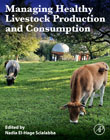
Managing Healthy Livestock Production and Consumption is a highly interdisciplinary resource based on scientific and empirical evidence. It is illustrated with best practices of low-input livestock systems from different continents and offers predictive modelling alternatives for a more resilient future. By addressing gaps of knowledge and presenting scientific perspective studies of livestock's impact on the environment and the global food supply up to 2050, this book is useful for those advocating for sustainable food systems. Existing evidence of the effects of livestock production on food quality and nutrition is reviewed. Livestock production and consumption is a highly diverse topic where current publications only include/focus a single aspect of the issues, for example, greenhouse gas emissions or health impacts, leading to unilateral decisions such as refraining from meat consumption. However, animals are necessary to soil fertility and ecosystems balance and a more realistic resource is necessary for researchers, scientists, and policy makers. This book clarifies perceptions by presenting sound scientific evidence across livestock landscapes for the scientific community to better appreciate the ecological web of life and the social web of community related to livestock production. An edited work written by globally diverse scientists and practitioners, including field workers, technicians, and policy makers, this is a valuable resource for researchers, teachers, and development agents working in the area of sustainable livestock production and consumption of animal source foods. National, international organizations, policy makers, and donors interested in sustainable development of the livestock sector will also find the information here practical and applicable. Describes the public-health impacts of sustainable diets and livestock products Presents the impacts of livestock production on the environment and food supply Explores future scenarios (up to 2050) of low input livestock systems Includes current case studies of low input livestock systems that offer potential for scaling-up and replication for sustainable livestock futures INDICE: Preface Acknowledgments Section 1 - Introduction 1. Introduction to livestock systems Section 2 - Animals and health 2. Livestock food and human nutrition 3. Livestock xenobiotics and zoonoses 4. Healthy livestock production and consumption 5. Pesticide safety in livestock products 6. Continuous development of animal welfare, with a focus on organic farming Section 3 - Livestock Landscapes 7. Livestock and future food supply 8. Pastoralism as a response to climate change and water security in Mediterranean mountains and forests 9. Landscape management: ecological engineering in temperate areas 10. Let them graze! Potentials of ruminant production outside the feed-food competition 11. The promises of food without soil and toil 12. Livestock as a tool to regenerate land Section 4 - Stories from around the world 13. Experiences of low-external-input livestock systems Improving land management through grazing strategies Subchapter 13.1: Rotational grazing in the Pampa, Argentina Subchapter 13.2: Holistic management of livestock, Zimbabwe Subchapter 13.3: Adapting to climate change in grasslands of Inner Mongolia, China Subchapter 13.4: Organic livestock management and climate resilience, New Zealand Subchapter 13.5: Conservation of native vegetation and traditional camel herding in Rajasthan, India Subchapter 13.6: Sustainability of organic dairy production in Tyrol pastures, Austria Subchapter 13.7: Feeding spineless cactus to cattle for drought resilience, Kenya Subchapter 13.8: Integrated organic livestock-crop production system, Thailand Subchapter 13.9: Improving nutrient efficiency through organic management, Madagascar Subchapter 13.10: Breeding for gastrointestinal parasite resistance in Merino sheep, Australia Subchapter 13.11: Animals for feeding soils on biodynamic farms, Egypt Section 5 - Conclusions 14. Full-cost accounting for decision-making related to livestock systems Index
- ISBN: 978-0-12-823019-0
- Editorial: Academic Press
- Encuadernacion: Rústica
- Páginas: 276
- Fecha Publicación: 03/12/2021
- Nº Volúmenes: 1
- Idioma: Inglés
